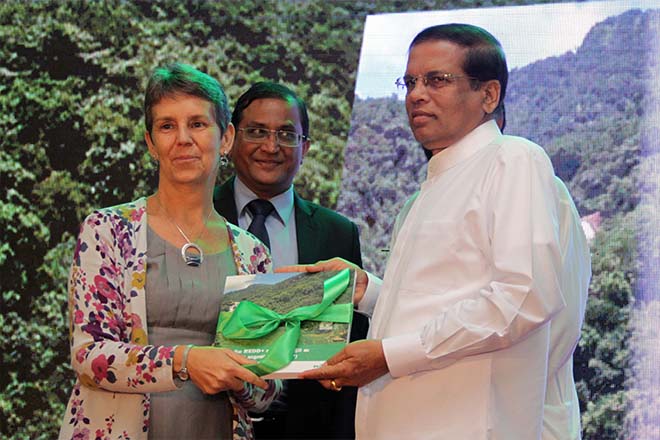Sri Lanka’s forest-based strategy to combat climate change

(PRESS RELEASE) - Colombo, Sri Lanka, 9th May, 2017: It is now an established fact that the root cause of rapidly increasing changes in climatic conditions across the world is a rise in the concentrations of heat-trapping carbon dioxide and other greenhouse gases in the atmosphere. According to NASA scientists, this decades-long trend of rapidly increasing average global temperature is continuing, and is aggravated with Arctic sea ice decline.
Through the Sri Lanka NEXT initiative, the Government of Sri Lanka is committed to achieving a sustainable development pathway that delivers broad-based economic growth while also contributing to the global fight against climate change. While the reduction of emissions is now given priority by progressive nations worldwide, the United Nations has been supporting the Government of Sri Lanka to find practical ways to safeguard and maintain the island’s forest cover through the UN-REDD Programme for nearly four years.
The UN-REDD Programme, which is the United Nations collaborative initiative on Reducing Emissions from Deforestation and forest Degradation (REDD), is currently supporting 64 developing countries with preparing and implementing forest-based national strategies aimed at combatting the threat of climate change. This global programme was launched by the UN in 2008 and builds on the convening role and technical expertise of the Food and Agriculture Organization of the United Nations (FAO), the United Nations Development Programme (UNDP) and the United Nations Environment Programme (UNEP).
Spearheaded by the Forest Department, Department of Wildlife Conservation and Climate Change Secretariat,a multi-stakeholder consultative process of the Government of Sri Lanka has resulted in the National REDD+ Strategy, which is named the National REDD+ Investment Framework and Action Plan – NRIFAP.
The first copy of this document was handed over to His Excellency MaithripalaSirisena, The President ofThe Democratic Socialist Republic of Sri Lankaby the UN Resident Coordinator Ms Una McCauley at a ceremony held at the BMICH on 9 May 2017. Completed as a 5 year, US $ 99 million strategy, financed mainly through international sources, NRIFAP provides 13 specific forest-centric policies and measures for implementation by the Government of Sri Lanka.
Indicating Sri Lanka’s “absolute commitment to follow a low-emission pathway,” His Excellency President MaithripalaSirisena stated that: “Since forests play the unique role of converting harmful emissions into harmless carbon, reducing emissions from deforestation and forest degradation (REDD+) is recognised as a global solution to greenhouse gas emissions. As the Minister in charge of environment in Sri Lanka, I also consider this a national priority.”
Endorsing the implementation of REDD+, the Prime Minister of Sri Lanka Hon. Ranil Wickremasinghe stated that: “As the Government of Sri Lanka plans to implement REDD+ in Sri Lanka, we would also like to invite the international community to partner with us towards an enterprise that aims at restoring the country’s eco balance while preserving the environment.”
During the four-year period of development of the strategy, a civil society platform, indigenous people’s forum, academic and research forum, and a private sector network have been established to support the government to implement REDD+ in Sri Lanka.
